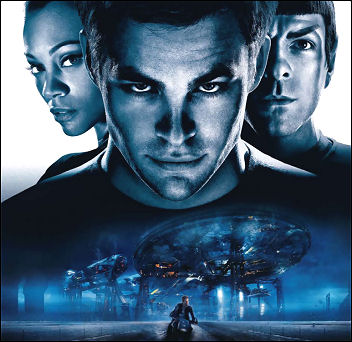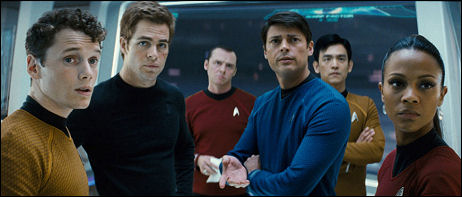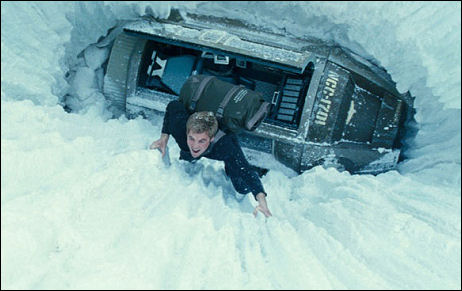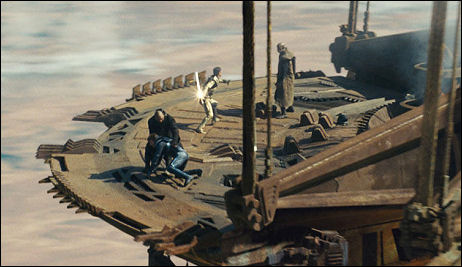JJ Abrams‘ Star Trek (Paramount, 5.8) is a lot of things, and all to the commercial good. I wasn’t moved to the depths of my soul, but it’s not supposed to make you want to hug your children or find God or cry. It’s supposed to engage and arouse in a half-spiritual, half-popcorn sense, and provide a sense of familial warmth. And avoid being too labored or ponderous. It’s supposed to just zip along and keep the ball in the air while fortifying that good old positivist Trek attitude. And that it does.

I went to last night’s all-media expecting to smile now and then and shrug my shoulders and say “whatever.” I’ve never been a big Trekkie type. But I came out feeling surprised and moderately pleased. I expected to be somewhat irritated by it, and this didn’t happen. I was nodding to the Paramount publicist after it was over. “Not bad, not bad at all,” I told her.
Star Trek is an efficiently made, intellectually game and tightly constructed movie-movie that’s closer to the spirit and intellectual vistas of the original mid ’60s Gene Roddenberry TV series than any of the feature film versions.
If you’re a serious Trek-hound this should be heartening news. The original show was about facing issues, exotic realms, positivism, intellectual engagement, echoes of social concerns and various matters of heart and spirit. Abrams’ Star Trek is largely an origin story so there’s no time or inclination to get into trippy-ass material, but I could easily imagine this new crew — Chris Pine‘s James Kirk, Zachary Quinto‘s Spock, Karl Urban‘s “Bones” McCoy, Zoe Zaldana‘s Uhura, Simon Pegg‘s Scotty, John Cho‘s Sulu and Anton Yelchin‘s Chekhov — grappling with some intellectually propelled, philosophically profound plots and themes in future outings.
With economy, scope and moxie, I mean, which is certainly what Abrams delivers here.
In fact — and I don’t want to say this in the wrong way — Abrams’ Star Trek is a bit like a super-expensive, hyper-cranked, widescreen pilot for a new Trek series that just happens to be playing in theatres. I’m just saying it is what it is. Abrams would be the last guy, I imagine, to say it’s in the realm of 2001: A Space Odyssey, and that’s cool by me. I imagine it’ll be cool with everyone. Star Trek doesn’t have a high-falutin’ sense of itself, but it doesn’t go the lowball route either.

Pine is certainly a younger, cockier and more brazen incarnation of Cpt. Kirk, but at the end of the day he shows balls and conviction and steadiness under fire — the essential qualities of any leader. I was a little put off at first by his surfer-dude, motorcycle-mechanic, Luke Skywalker by way of a Southern Californian stud-lifeguard mentality, but at least he’s his own guy. There’s very little Shatner or Jeffrey Hunter in him.
Quinto is a superb Spock — focused, steely, unflappable. (And with a spiritual/ romantic/sexual component this time!) And Urban — my third favorite character — is a sharply drawn, aggressive, compassionate fellow to have on your team. He’s no stooge.
I felt after seeing early footage last December that Yelchin could’ve toned down the Russian accent but I got used to it after a while. Pegg’s Scotty is amusing in a sort of loudmouth-Brit way. The attractive Zaldana does a fine job of inhabiting a secondary character who happens to look great in underwear.
My all-time favorite Trek film is still Galaxy Quest, which made me feel the current in a way that none of the William Shatner-Leonard Nimoy movies did. (I don’t care if it was a spoof — it got what the whole Trek culture is about.) But Abrams’ version runs a close second.

Star Trek pissed me off only three or four times, and trust me, that’s almost a kind of compliment. It can’t be be easy to assemble a nifty sci-fi adventure flick and make it all hum like a single organism, and this has certainly been done by director Abrams and screenwriters Roberto Orci and Alex Kurtzman.
I’ll list my three or four complaints in a subsequent piece. There’s plenty of time. I can’t sit here and write this thing indefinitely.
All right, I have time for one beef. I didn’t much care for Eric Bana‘s Cpt. Nero, who seems to have been told to scowl or at least look really pissed off in each and every scene. Villains don’t see themselves as villains when they look in the bathroom mirror. They see themselves as guys doing what they have to do in order to protect their own and/or exact vengeance from their enemies. They see themselves, in other words, as good guys forced to respond to special circumstances.
My misfortune was sitting next to a guy who laughed and went “whoo-hoo!” at almost everything that happened. I glared at him three or four times and then gave up. He thought it was hilarious when Pine bumped his head on the ceiling of a galactic transport. And I hated the spazzy sound of his laughter — “Hee-hee-hee-hee-hee!” I despise people who over-react to films, who show any level of disproportionate enthusiasm. I should have just moved. The guy had a 1959 flat-top haircut with whitewalls on the side. That was a tip-off right there.

